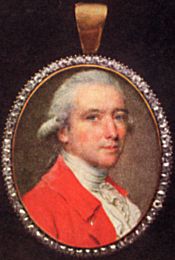Robert Brooke (East India Company officer) facts for kids

Robert Brooke (1744–1811) was an important figure in history. He was a high-ranking officer, a lieutenant-colonel, in the army of Bengal (a region in India). He also served as the governor of the small island of St Helena from 1788 to 1800. In 1775, he married Anna Maria Mapletoft. They had five sons and two daughters together.
Contents
Robert Brooke's Early Life
Brooke was born in Rathavan House, Co. Cavan, Ireland. When he was 20 years old, in 1764, he joined the British East India Company. This company was very powerful and managed trade and even parts of India for Britain. After working in military administration in India, he took a break due to illness. He then moved back to Co. Kildare in Ireland. In 1775, he married Anna Maria Mapletoft Wynne. They built a house called Killybegs House, which was later taken down in 1958.
Starting a Cotton Industry
Robert Brooke had a big dream: he wanted to start a cotton industry in Ireland. The town of Prosperous was actually created because of his ideas. In the late 1700s, many people in Ireland tried to start new industries. Brooke chose cotton manufacturing for Prosperous in 1780. He even named the town "Prosperous" because he was so confident it would succeed!
However, things did not go as planned. Within six years, his project failed badly. He used his own money, his wife's money, and even grants from the government. He lost so much money that it was almost as much as the country's entire debt at the time. By 1784, he had employed almost 4,000 people. But by 1786, he had to give up his factories and all his remaining property to the people he owed money to. The town of Prosperous struggled so much that by 1837, it was described as "little more than a pile of ruins."
Becoming Governor of St Helena
Even though he had stayed away from his military duties longer than allowed, Robert Brooke asked to rejoin the army. At first, his request was turned down. But soon after, he was made governor of Saint Helena. He took over the role of Governor of Saint Helena in 1788, replacing Daniel Corneille.
Governor of St Helena: His Achievements
Brooke was chosen to be governor after a group of soldiers on the island had rebelled under the previous civilian governor. His military background was likely seen as a good way to keep order. However, Governor Brooke is most remembered for all the new buildings and projects he started during his time in charge.
These important projects included:
- Setting up a special signal system to announce when ships arrived.
- Building strong defenses to protect the island from attacks.
- Creating pipe networks to bring fresh water to people.
- Expanding farming areas all over the island.
- Building a safe place for ships to land.
In addition, Brooke made rules to stop the bad treatment of slaves and to help them live better lives. He also used St Helena's location, which is halfway between Britain and Cape Colony (South Africa). He sent soldiers and supplies from St Helena to help protect Cape Town, which was held by the British. Because of this, the East India Company gave him a special sword with a diamond handle. He also created a local army on the island. He even tried to grow plants like breadfruit and sago there, getting seedlings from Captain William Bligh in 1792.
Robert Brooke's Retirement
Robert Brooke retired in 1800. He left the island on March 16, 1800. Another governor, Lieutenant-Governor Francis Robson, took over for a short time. Then, on March 11, 1802, Colonel Robert Patton, who was Brooke's sister-in-law's husband, became the new governor.
Brooke passed away in 1811 at his home in Bath, Somerset. There is a special plaque in the church of St. Swithin, Walcot, Bath, that praises his many good qualities. His old home at No. 8 Somerset Place in Bath later became part of the University of Bath Spa. It has since been sold and is now a private home again.
Robert Brooke is still remembered in Prosperous, County Kildare, where he tried to start his cotton industry. There are two plaques on walls there. One marks 200 years since the town was founded. The other shows two women working at weaving machines. There are also two street names in the area that are linked to his family.
 | Jessica Watkins |
 | Robert Henry Lawrence Jr. |
 | Mae Jemison |
 | Sian Proctor |
 | Guion Bluford |

